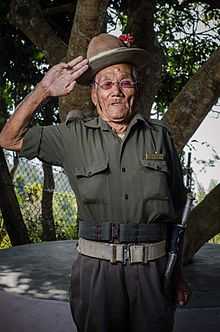The Gurkha Welfare Trust
 | |
| Founded | 1969 |
|---|---|
| Type | Charitable organisation |
| Focus | Gurkha veterans and their dependants |
| Location | |
Area served | Nepal and worldwide |
| Mission | The Gurkha Welfare Trust provides welfare to enable Gurkha ex-servicemen and their dependants to live out their lives with dignity, primarily in Nepal but increasingly in the UK and elsewhere. |
| Website | http://www.gwt.org.uk/ |
The Gurkha Welfare Trust (GWT) is a British charity (Reg Charity No. 1103669) established in 1969. It is the principal UK charity dedicated to the provision of aid to Gurkha ex-servicemen and their dependants in their homeland of Nepal, and increasingly in the UK and elsewhere.
Nepal has limited industry, agriculture and infrastructure. It also lacks an effective public social welfare system. This means that the work of the Trust is critical in improving conditions for ex-servicemen and their dependants, who are often unable to work through age, illness or injury.
The Patron of the Trust is HRH The Prince of Wales; the Chairman of the Board of Trustees is General Sir Peter Wall GCB, CBE, ADC Gen and the current Director is Colonel William Shuttlewood OBE.
Each year, by tradition, all serving Officers and Other Ranks in the Brigade of Gurkhas contribute a day's pay to the Trust.
History

In 1969, it was realised that a great number of Gurkha soldiers and their dependants or widows in Nepal faced destitution in old age. Many of these soldiers had served in the Second World War; however they had not served the 15 years needed to qualify for an army pension. Unlike their British counterparts who could rely on the Welfare State in old age, the Nepalese Gurkha had no such safety net.
In recognition of the country’s debt of honour to these soldiers, a public appeal – organised by British Gurkha officers – raised £1m to establish The Gurkha Welfare Trust. It began to create a network of bases in Nepal to distribute financial aid to retired soldiers who had met with disasters such as landslides and floods. The Trust also bought land for ex-Gurkhas to become subsistence farmers and provide enough food to support their families.
In an arrangement that endures to this day, the Trust agreed a deal that its administrative costs would be largely met by a grant in aid funding from the Ministry of Defence.
Activity in Nepal
Today, the Trust’s field delivery arm – The Gurkha Welfare Scheme – employs around 360 staff members in Nepal. Its footprint includes 19 operational bases (Area Welfare Centres) across Nepal that are run by former Gurkhas, as well as one in Darjeeling, India. Each day, old Gurkhas come to these centres with their health and welfare needs. Every quarter, a steady stream of Gurkhas walk anything up to two or three days to claim their pensions.
The Trust pays a monthly stipend, enough for basic food, to just under 7,000 needy Gurkha ex-servicemen and widows in Nepal who do not receive a military pension (15 years' military service is required to earn such a pension). Medical treatment is also provided for them and their dependants. In addition, hardship grants are awarded to alleviate destitution following fire, flood and other natural disasters. The Trust runs two Residential Homes in Pokhara and Dharan, offering full-time care for some of its most vulnerable pensioners.
In addition to its relief work for Gurkha veterans, the Trust also invests in Community Aid projects for the wider Nepalese population. It has built 125 new schools and runs an extensive renovation programme for dilapidated schools, improving access to education for nearly 550,000 Nepali children since the programme began in 1989. Enhancements in existing schools include IT classrooms, libraries and science laboratories.
DFID entrusts the GWT with delivering its Rural Water and Sanitation Programme in Nepal. Clean water supply systems and sanitation schemes are introduced to around 80 villages across the country each year, drastically reducing sickness rates and labour hours in those communities. To date, around 300,000 people in 1,400 villages have benefited from the Trust’s water projects.
With funding from the Kadoorie Agriculture Aid Association, the Trust organises eight annual open medical camps, performing thousands of dental extractions and cataract operations while offering free GP and gynaecology checks, performing minor surgery and distributing free medication. Around 14,500 Nepali people benefit from these camps each year.
Activity in the UK
Following a change in legal status in 2009, many Gurkhas who retired pre-1997 chose to move to the UK on a permanent basis. The Trust runs two Gurkha Welfare Advice Centres in Salisbury and in Aldershot to assist Gurkha pensioners in their transition to life in the UK. The Advice Centres also provide outreach surgeries in communities where there are significant Gurkha populations.
Gurkha 200
2015 marks the bicentenary of Gurkha service to the British Crown. In honour of this historic milestone, various commemorative events will be held throughout the year to celebrate the Gurkhas’ contribution to the British Army. All proceeds raised will go to The Gurkha Welfare Trust’s Bicentenary Appeal: "Our Duty of Care", to expand its medical programme in Nepal.